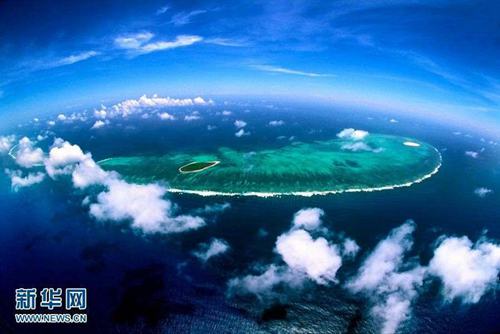

 |
The U.S. Secretary of State John Kerry recently kicked off his first Asian trip in 2016. Western media, keeping a close eye on Kerry’s agenda, believe the South China Sea issue will be one of the priorities during the trip taking him to Laos, Cambodia and China.
Their concerns were not raised out of nowhere. At the Davos World Economic Forum not long ago, the U.S. Secretary of Defense, Ash Carter, claimed that Beijing is taking “self-isolating” steps in the South China Sea. He even urged other countries to seek help from the U.S.
As for Kerry’s itinerary this time, comments from Reuters and other media suggest that the U.S. will urge ASEAN countries to contain China together.
A U.S. official even told the press that the ASEAN hopes to avoid “militarization” and conflicts by “safeguarding maritime rights and interests”.
Repeated voices from the U.S. are by no means unintentional. It is clearly motivated by three objectives.
First of all, the U.S. attempts to interfere in China’s legitimate construction activities on the Nansha Islands.
In order to force China to halt construction, the U.S., ignoring China’s sovereignty over the South China Sea, has made multiple groundless criticisms, and even accused China of “militarizing” the region.
Secondly, with the groundless excuse that China will “bully” small countries, the U.S. tried to undermine China’s efforts to settle disputes through negotiations with the parties directly concerned.
In the meantime, the superpower has been stirring up the arena of the South China Sea. It instigated ASEAN countries to increase tensions by taking advantage of their concerns.
On the one hand, the U.S. adds pressure on China on the issue by urging other ASEAN members to support the Philippines’ territorial appeal. It helped the Philippines file a unilateral arbitration in the name of safeguarding international law.
The U.S., therefore, has become a backstage driving force for escalating tensions in the South China Sea.
Lastly, such acts by the U.S. aim to pave a way for demonstration of its military power.
Last October, the U.S. sent a military vessel to enter into waters near China’s Nansha Islands in spite of China’s opposition, and announced to “regularly” conduct such activities on the grounds of safeguarding freedom of navigation.
Realizing the freedom is not jeopardized, the U.S. has to justify its behaviors by hyping up so called “China threats”.
Encouraging ASEAN to patrol the sea is just another attempt to normalize its actions through numerical strength.
The “diligent work” of the U.S., however, did not work as it expected.
The U.S. cannot deny the historical and lawful evidence that proves China’s sovereignty interests over the South China Sea, neither can it stop China’s construction on the islands.
Its provocations will only further prove it is the U.S. that threatens regional stability and pushes forward the dangerous “militarization”.
Most ASEAN members are clear-headed when it comes to the South China Sea issue, and will not endorse the Philippines without any principles.
Despite incitement from the U.S., Cambodian Deputy Prime Minister and Foreign Minister Hor Namhong said that individual countries should settle disputes among themselves without the involvement of the ASEAN.
China also said previously that U.S. officials cannot speak for ASEAN countries.
As for patrolling the South China Sea, the ASEAN will not stand beside the U.S. since it fears that the Eagle’s actions will trigger military conflicts.
The ASEAN is also unwilling to get involved in the issue, let alone conduct patrols recklessly.
China has always advised the U.S. with kind words, hoping it can focus more on the big picture of bilateral ties
Chinese President Xi Jinping pointed out that the enhanced China-U.S. cooperation will bring enormous benefits to the world during his meeting with Kerry on Wednesday, as he had stressed on many occasions.
Both countries agree to build a new type of major-country relations under the principles of peace, mutual respect and win-win cooperation. The South China Sea issue should not be used as excuse to undermine China-U.S. relations.
(The author is an expert on international studies.)
 A foreign girl explains what China should be proud of
A foreign girl explains what China should be proud of Chinese navy's air-cushioned landing craft in pictures
Chinese navy's air-cushioned landing craft in pictures Chinese pole dancing master opens class in Tianjin
Chinese pole dancing master opens class in Tianjin PLA holds joint air-ground military drill
PLA holds joint air-ground military drill Charming female soldiers on Xisha Islands
Charming female soldiers on Xisha Islands Beautiful skiers wear shorts in snow
Beautiful skiers wear shorts in snow Getting close to the crew on China's aircraft carrier
Getting close to the crew on China's aircraft carrier Chinese stewardess celebrate test flight at Nansha Islands
Chinese stewardess celebrate test flight at Nansha Islands Pentagonal Mart becomes the largest vacant building in Shanghai
Pentagonal Mart becomes the largest vacant building in Shanghai Top 20 hottest women in the world in 2014
Top 20 hottest women in the world in 2014 Top 10 hardest languages to learn
Top 10 hardest languages to learn 10 Chinese female stars with most beautiful faces
10 Chinese female stars with most beautiful faces China’s Top 10 Unique Bridges, Highways and Roads
China’s Top 10 Unique Bridges, Highways and Roads Out of the shadows
Out of the shadows China not interested in Chinese-speaking panda
China not interested in Chinese-speaking panda Chinese couples flock to Thailand for cheap IVF, illicit gender selection
Chinese couples flock to Thailand for cheap IVF, illicit gender selection Alibaba, Baidu, Tencent make big plans for annual red envelope giveaway
Alibaba, Baidu, Tencent make big plans for annual red envelope giveawayDay|Week